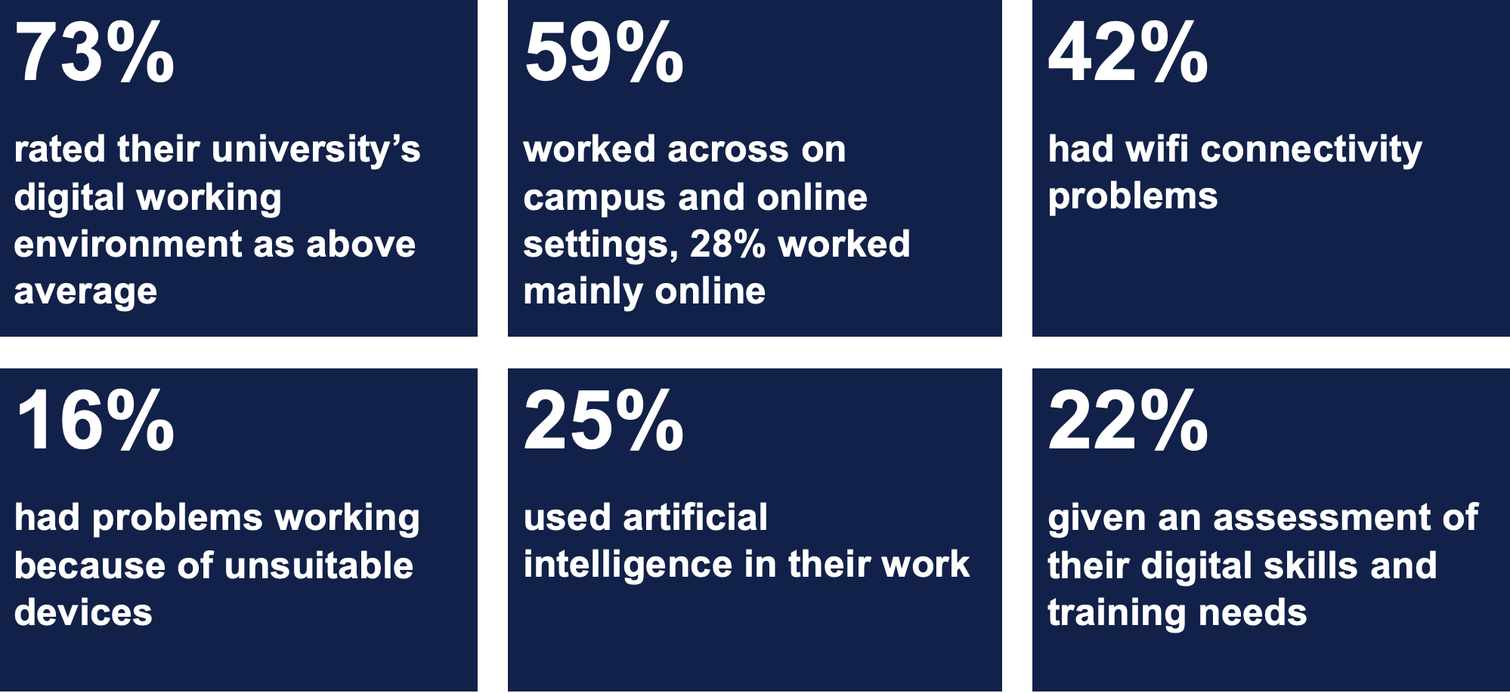2023/24 UK higher education professional services staff digital experience insights survey findings
The digital experience insights survey for higher education professional services staff took place between October 2023 and June 2024. Participating universities were able to select their own survey period within these dates, typically a three to four week window.
There were 5,224 respondents from 27 different organisations. 19 of these were based in England, five in Scotland and three in Wales. These 27 organisations represent 8% of all higher education providers in the UK.
The highest number of responses from a single organisation was 771 professional services staff (26% of their total professional services staff population) and the mean number of responses was 192 per organisation (on average 16.6% of the total number of professional services staff in each organisation that participated). No organisation contributed fewer than 20 responses.
A survey indicating the digital experience of further education professional services staff was run simultaneously and results can be found on our 2023/24 further education professional services staff report page.
Through Jisc’s digital experience insights service, organisations can gain valuable data to inform strategic, operational and digital investment decisions, evidence year-on-year improvements and demonstrate return on investment. Organisations that take part have access to their own data to assess their unique situations as well as benchmarking data. Full information about the digital experience insights surveys is detailed on our information page.
Executive summary

Our 2023/24 digital experience insights survey for higher education professional services staff explored the experience of using digital technologies in a variety of professional job roles. We gained insights into the overall digital environment they worked in, including the infrastructure, support and opportunities to develop digital skills offered by higher education organisations. We established the key devices used by and activities undertaken by professional services staff, as well as their opinions on how well supported they felt to use digital tools effectively in their work. Staff from 27 organisations across the UK shared their experiences.
This year, our survey indicated that professional services staff continued to work flexibly, with many (59%) working in a hybrid manner on campus and online. The percentage of staff who worked in a mixture of on campus and online environments, compared to mainly on campus or mainly online, remained about the same as in last year’s survey. The ability to work either on campus or remotely meant that staff could potentially be more productive while working in more comfortable and private spaces. Most (73%) staff gave a positive rating (‘best imaginable’, ‘excellent’ or ‘good’) to their digital working environment. For many, remote access to systems worked well and staff could collaborate effectively with colleagues using cloud-based documents and various communication channels. However, many respondents experienced problems using digital technologies, both in on campus and off campus locations.
Although many staff expressed how digital technologies enabled more creativity and created efficiencies in their work, others encountered problems progressing in their work because of connectivity problems and device issues. 42% of staff had issues with wifi (34% on campus), while over a quarter (27%) could not access the systems they needed either on or off campus. In addition, some staff (16%) reported issues with unsuitable devices, including low specification computers and a lack of peripheral devices (eg additional monitors), and when they had issues with devices or connectivity, support may not have been available. These problems may have contributed to a decline in the percentage of staff who felt that digital technologies were convenient for them (74% this year, 88% in 2022/23).
Staff continued to face issues in their work because of unsuitable working spaces on campus and because of issues with communication with their teams and colleagues in other departments. About a third of respondents (32%) felt that they did not have a private area to work. This resulted in issues such as a lack of privacy for in person or online meetings, as well as disruption from other colleagues having meetings. Others felt disconnected from their colleagues and experienced issues in online communications. Less than half (47%) felt that technologies helped them feel part of a community of staff and students. When talking about their experiences of using digital technologies, a number of staff felt isolated from their colleagues and preferred in person meetings to the variety of online communication channels.
Many respondents indicated that they wished to develop their understanding and competencies around digital technologies. Indeed, support for skills development improved in some areas. Just over half (52%) said that training in basic IT skills was offered by their organisation, an increase from 37% in 2022/23. Other areas also saw notable increases, such as handling digital information, data and media (39% this year, 30% in 2022/23). However, many staff noted that training was unavailable or not available regularly, including intermediate and advanced level training for various systems and skills. In addition, more holistic support for professional development was felt to be lacking. Less than a quarter (22%) said they were offered an assessment of their digital skills and training needs, and only a quarter (25%) felt they had the time to explore new digital tools and approaches.
We asked about the provision and use of artificial intelligence (AI) for the first time. 12% of staff said they were provided with artificial intelligence systems, chatbots or assistants to support their work, and a similar percentage (11%) said they were offered training in their appropriate use. However, many more (25%) actually used artificial intelligence tools as part of their work. This included ChatGPT and tools that included AI features, including collaboration and communication tools.
Full report
Download our 2023/24 UK higher education (HE) professional services staff digital experience insights survey findings [pdf].